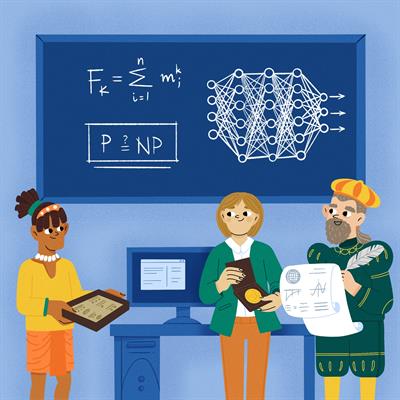
Math That Changed the World
Collection Editors
Idan Segev, Jeremy Martin, Robert KnightViews
117,423 viewsParticipating Sections
Abstract Submission Deadline
21.11.2023
Submission Deadline
22.11.2023
Extended Deadline
24.11.2023
Articles

Mathematics and Economics
25/01/2024
Easy Or Hard? Basic Questions in Computational...
Authors
Noa Segev, Avi Wigderson
Engineering and Technology
25/01/2024
The Math Behind the Movies
Authors
Pat Hanrahan
Mathematics and Economics
22/11/2023
Wavelets: Mathematical Tools for Image Analysis
Authors
Ingrid Daubechies
Mathematics and Economics
22/11/2023
Combinatorics: The Mathematics of Fair Thieves...
Authors
Noga AlonAbout this collection
Mathematics is as old as civilization. The Maya developed sophisticated arithmetic to study the stars and the weather, the ancient Greeks used geometry to estimate the size of the earth with remarkable accuracy, and the Chinese mathematician Liu Hui calculated pi to five decimal places two millennia before computers had been invented. And mathematics is alive and well today, with new discoveries made every day, sometimes about problems that are easy to understand but surprisingly difficult to solve.Some problems lie around for centuries waiting to be solved: Johannes Kepler made a guess in 1611 about how a pile of spheres could be packed most densely into three-dimensional space; it took four centuries until Thomas Hales proved that Kepler was right. And mathematicians love to expand old problems and turn them into new ones: Marina Viazovska won a Fields Medal in 2022, equivalent to a Nobel Prize, for solving an even harder version of Kepler's problem!
Much of the power of mathematics comes from how it enables us to understand things that we can't see or experience directly. And throughout the history of mathematics, abstract ideas have proven to be unexpectedly useful in solving concrete problems. Mathematicians have been playing with prime numbers since antiquity; who would have thought that they would become an essential ingredient of modern cryptography? Who would have thought that complex numbers, first discovered in the 1500s and derided as "imaginary," would turn out to be exactly the right tools to describe real world phenomena like radio signals and electrical circuits? Even infinity, literally the biggest mathematical concept of all, is useful: Georg Cantor's revolutionary discovery that infinity itself comes in different sizes introduced ideas that have become indispensable for the study of computers and computer algorithms.
Every year, the Abel Prize, the Gödel Prize and the Turing Award honor far-reaching mathematical discoveries. Sometimes these discoveries are brand new ideas, and sometimes they are applications of mathematics to solve real-world problems. In this collection, recipients of these awards will show you both the beautiful abstract ideas they study, and the amazing power they have to transform the modern world.
Would you like to submit to this collection?
For researchers interested in submitting to this Collection, please consult our author guidelines and check that you have all the essentials included before submitting










